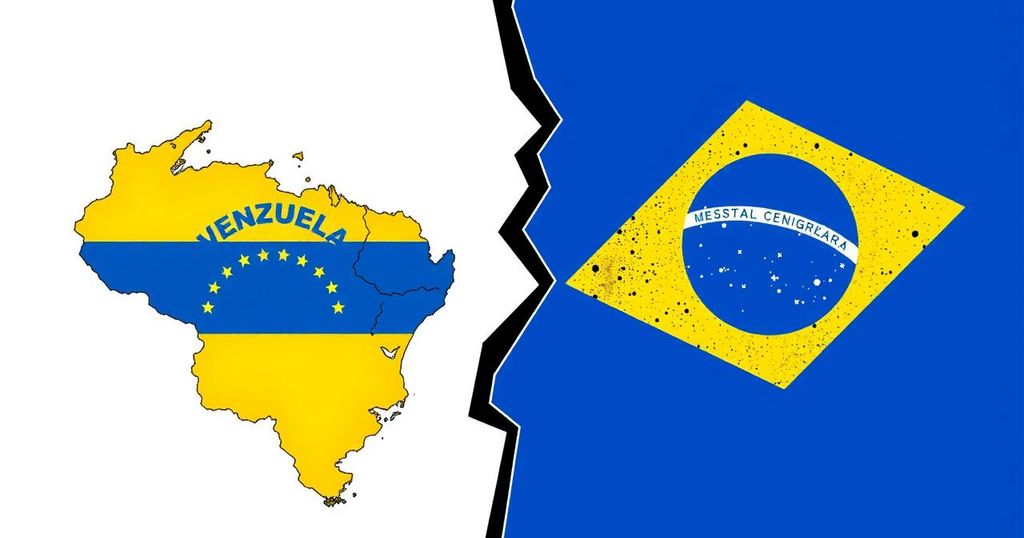Venezuela’s relations with Brazil have soured dramatically after the latter opposed Maduro’s bid to join the BRICS group, leading to verbal clashes and diplomatic actions. Venezuelan officials accused Brazil of interference and betrayal, while Brazil cited concerns over Venezuela’s political standing as justification for its veto.
Tensions between Venezuela and Brazil have escalated following Venezuelan President Nicolas Maduro’s thwarted aspirations to join the BRICS coalition of emerging market nations, particularly due to Brazil’s opposition. On Wednesday, Jorge Rodriguez, President of Venezuela’s National Assembly and an ally of Maduro, aggressively criticized Celso Amorim, a chief foreign policy adviser to Brazilian President Luiz Inacio Lula da Silva, claiming Amorim was acting in alignment with U.S. interests. Consequently, Venezuela’s government announced the recall of its ambassador from Brasilia and summoned Brazil’s chargé d’affaires for reprimand, as Brazil’s ambassador is currently on leave. Lula has remained silent about these events, having missed a recent summit in Kazan, Russia, due to a head injury. However, Amorim cited Brazil’s concerns over Venezuela’s regional repute, particularly after the disputed presidential elections of July, as the reason for excluding Venezuela from BRICS expansion. Rodriguez accused Amorim of interference in Venezuelan affairs, stating, “You behaved in a malicious manner, more like an interlocutor of the US government than in the role supposedly assigned by President Lula.” Maduro, who claimed victory in the July elections without offering concrete voting evidence, intended to secure Venezuela’s membership alongside countries like Cuba and Bolivia during the summit in Russia. Following the denial of this request, Maduro and his administration launched a wave of criticism against Brazilian officials, alleging that Brazil had acted treacherously. In his own remarks, Maduro insisted, “No one shuts Venezuela up or vetoes it,” indicating his determination to remain engaged despite the setback. In the wake of these developments, Amorim characterized Venezuela’s response as “totally disproportionate,” declining to further comment. Lula, alongside Colombian President Gustavo Petro, attempted to mediate the situation post-election but adopted a more critical stance towards Maduro’s government in subsequent reactions. Venezuela’s government claims Maduro was awarded a narrow victory in the elections by the state-controlled electoral body, a claim vigorously contested by the opposition, which has presented evidence indicating that its candidate received a significant majority of the votes.
The recent deterioration of relations between Venezuela and Brazil stems from the exclusion of Venezuela from the BRICS organization, a collective of emerging economies that includes countries like Russia, India, and China. Following Hugo Chavez’s era, the Venezuelan political landscape has been marked by increasing tensions between Maduro’s regime and its South American neighbors, particularly after controversial electoral practices and alleged human rights violations. These concerns have deepened Brazil’s reluctance to accept Venezuela’s membership, citing doubts about its qualifications as a representative in the international arena, especially after Maduro’s claims of victory in a disputed election. As Brazil and Venezuela navigate the intricacies of diplomatic relations, the political rhetoric and alliances within the region continue to evolve.
In summary, the escalating tensions between Venezuela and Brazil over BRICS membership highlight the ongoing complexities of regional politics in South America. President Maduro’s rejection of the exclusion and subsequent remarks reflect a broader struggle for legitimacy both domestically and internationally. The critical response from Brazil, notably through its foreign policy adviser Amorim, underscores the challenges of regional cooperation amid unresolved political disputes. As relations remain tense, both nations may need to reassess their discourse and diplomatic engagement strategies moving forward.
Original Source: www.livemint.com







